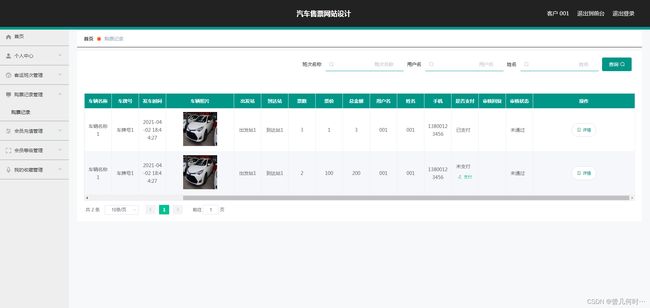基于SSM+Vue的汽车售票网站的设计与实现
末尾获取源码
开发语言:Java
Java开发工具:JDK1.8
后端框架:SSM
前端:采用Vue技术开发
数据库:MySQL5.7和Navicat管理工具结合
服务器:Tomcat8.5
开发软件:IDEA / Eclipse
是否Maven项目:是
目录
一、项目简介
二、系统设计
设计原则
三、系统项目截图
客运班次管理
会员充值管理
购票记录管理
留言板管理
客运班次
购票记录
会员充值
留言反馈
客运班次
会员购票记录
四、核心代码
4.1登录相关
4.2文件上传
4.3封装
一、项目简介
互联网发展至今,无论是其理论还是技术都已经成熟,而且它广泛参与在社会中的方方面面。它让信息都可以通过网络传播,搭配信息管理工具可以很好地为人们提供服务。针对汽车售票信息管理混乱,出错率高,信息安全性差,劳动强度大,费时费力等问题,采用汽车售票网站可以有效管理,使信息管理能够更加科学和规范。
汽车售票网站在Eclipse环境中,使用Java语言进行编码,使用Mysql创建数据表保存本系统产生的数据。系统可以提供信息显示和相应服务,其管理员负责审核会员充值,审核客户购票信息以及会员购票信息,管理客运班次与留言板,管理会员等级。客户查看客运班次,购买并支付车票,在前台联系客服,向管理员留言,在后台查看购票记录,进行会员充值。会员通过会员购票渠道进行购票,并在后台支付车票,查看购票审核情况,查看会员等级,管理收藏信息。
总之,汽车售票网站集中管理信息,有着保密性强,效率高,存储空间大,成本低等诸多优点。它可以降低信息管理成本,实现信息管理计算机化。
二、系统设计
一个成功设计的系统在内容上必定是丰富的,在系统外观或系统功能上必定是对用户友好的。所以为了提升系统的价值,吸引更多的访问者访问系统,以及让来访用户可以花费更多时间停留在系统上,则表明该系统设计得比较专业。
设计原则
本系统在设计过程中需要依照一定的设计原则进行,目的就是为了让开发的系统具备高质量,齐全完备的功能,方便简单的操作,如此才可以最大限度的满足使用者的要求。系统设计原则除了基本的易操作原则外,还有安全性原则,准确性原则。
第一个设计原则:易操作原则,针对本系统设计的功能要完备齐全,编码时,设计的各个接口要具备友好性,使用者一旦使用本系统时,要能够轻松上手,操作本系统处理数据时,要具备便利性。此外,也需要设计一些必要提示,引导使用者操作系统。
第二个设计原则:安全性原则,本系统在登录模块要对各个访问者进行身份验证,系统会通过访问者输入的信息进行判断,使用提前编写的安全验证代码进行数据比对,引导匹配成功的访问者进入指定的操作界面。这样可以避免无关性访问者窃取系统的数据。
第三个设计原则:准确性原则,为了保证使用者登记的数据是正确的,需要提前设计数据纠错机制,让使用者可以通过系统的报错提示,仔细检查登记的错误信息,并及时纠正错误,填写规范正确的信息。比如设置密码时,要求密码的长度不能低于6个字符,且数据类型要求不能全部是数字等都能进行规范。
三、系统项目截图
客运班次管理
管理员进入指定功能操作区之后可以管理客运班次。其页面见下图。管理员增删改查客运班次信息。
会员充值管理
管理员进入指定功能操作区之后可以管理会员充值。其页面见下图。客户升级会员需要进行会员充值,管理员只需审核充值信息即可。
购票记录管理
管理员进入指定功能操作区之后可以管理购票记录。其页面见下图。购票记录信息是客户购票产生的信息,管理员需要查看其是否支付,并在线审核。
留言板管理
管理员进入指定功能操作区之后可以管理留言板。其页面见下图。前台的客户还有会员如果需要向管理员咨询信息,可以通过留言功能实现,管理员查看后会回复。
客运班次
客户进入指定功能操作区之后可以查看客运班次信息。其页面见下图。客户在没有成为会员之前,购票就不能享受折扣优惠。
购票记录
客户进入指定功能操作区之后可以查看购票记录。其页面见下图。客户查看购票记录的同时,也需要支付购买的车票。
会员充值
客户进入指定功能操作区之后可以进行会员充值。其页面见下图。客户想要成为会员,可以进行会员充值,待管理员审核通过后,客户就升级成为一名会员。
留言反馈
会员进入指定功能操作区之后可以对管理员留言。其页面见下图。留言时需要处于登录状态,然后才能提交留言内容。
客运班次
会员进入指定功能操作区之后可以查看客运班次。其页面见下图。会员通过会员购票渠道进行购票,可以享受折扣。
会员购票记录
会员进入指定功能操作区之后可以查看会员购票记录。其页面见下图。会员支付购买的车票,查看购票信息审核情况。
四、核心代码
4.1登录相关
package com.controller;
import java.util.Arrays;
import java.util.Calendar;
import java.util.Date;
import java.util.Map;
import javax.servlet.http.HttpServletRequest;
import org.springframework.beans.factory.annotation.Autowired;
import org.springframework.stereotype.Controller;
import org.springframework.web.bind.annotation.GetMapping;
import org.springframework.web.bind.annotation.PathVariable;
import org.springframework.web.bind.annotation.PostMapping;
import org.springframework.web.bind.annotation.RequestBody;
import org.springframework.web.bind.annotation.RequestMapping;
import org.springframework.web.bind.annotation.RequestParam;
import org.springframework.web.bind.annotation.ResponseBody;
import org.springframework.web.bind.annotation.RestController;
import com.annotation.IgnoreAuth;
import com.baomidou.mybatisplus.mapper.EntityWrapper;
import com.entity.TokenEntity;
import com.entity.UserEntity;
import com.service.TokenService;
import com.service.UserService;
import com.utils.CommonUtil;
import com.utils.MD5Util;
import com.utils.MPUtil;
import com.utils.PageUtils;
import com.utils.R;
import com.utils.ValidatorUtils;
/**
* 登录相关
*/
@RequestMapping("users")
@RestController
public class UserController{
@Autowired
private UserService userService;
@Autowired
private TokenService tokenService;
/**
* 登录
*/
@IgnoreAuth
@PostMapping(value = "/login")
public R login(String username, String password, String captcha, HttpServletRequest request) {
UserEntity user = userService.selectOne(new EntityWrapper().eq("username", username));
if(user==null || !user.getPassword().equals(password)) {
return R.error("账号或密码不正确");
}
String token = tokenService.generateToken(user.getId(),username, "users", user.getRole());
return R.ok().put("token", token);
}
/**
* 注册
*/
@IgnoreAuth
@PostMapping(value = "/register")
public R register(@RequestBody UserEntity user){
// ValidatorUtils.validateEntity(user);
if(userService.selectOne(new EntityWrapper().eq("username", user.getUsername())) !=null) {
return R.error("用户已存在");
}
userService.insert(user);
return R.ok();
}
/**
* 退出
*/
@GetMapping(value = "logout")
public R logout(HttpServletRequest request) {
request.getSession().invalidate();
return R.ok("退出成功");
}
/**
* 密码重置
*/
@IgnoreAuth
@RequestMapping(value = "/resetPass")
public R resetPass(String username, HttpServletRequest request){
UserEntity user = userService.selectOne(new EntityWrapper().eq("username", username));
if(user==null) {
return R.error("账号不存在");
}
user.setPassword("123456");
userService.update(user,null);
return R.ok("密码已重置为:123456");
}
/**
* 列表
*/
@RequestMapping("/page")
public R page(@RequestParam Map params,UserEntity user){
EntityWrapper ew = new EntityWrapper();
PageUtils page = userService.queryPage(params, MPUtil.sort(MPUtil.between(MPUtil.allLike(ew, user), params), params));
return R.ok().put("data", page);
}
/**
* 列表
*/
@RequestMapping("/list")
public R list( UserEntity user){
EntityWrapper ew = new EntityWrapper();
ew.allEq(MPUtil.allEQMapPre( user, "user"));
return R.ok().put("data", userService.selectListView(ew));
}
/**
* 信息
*/
@RequestMapping("/info/{id}")
public R info(@PathVariable("id") String id){
UserEntity user = userService.selectById(id);
return R.ok().put("data", user);
}
/**
* 获取用户的session用户信息
*/
@RequestMapping("/session")
public R getCurrUser(HttpServletRequest request){
Long id = (Long)request.getSession().getAttribute("userId");
UserEntity user = userService.selectById(id);
return R.ok().put("data", user);
}
/**
* 保存
*/
@PostMapping("/save")
public R save(@RequestBody UserEntity user){
// ValidatorUtils.validateEntity(user);
if(userService.selectOne(new EntityWrapper().eq("username", user.getUsername())) !=null) {
return R.error("用户已存在");
}
userService.insert(user);
return R.ok();
}
/**
* 修改
*/
@RequestMapping("/update")
public R update(@RequestBody UserEntity user){
// ValidatorUtils.validateEntity(user);
userService.updateById(user);//全部更新
return R.ok();
}
/**
* 删除
*/
@RequestMapping("/delete")
public R delete(@RequestBody Long[] ids){
userService.deleteBatchIds(Arrays.asList(ids));
return R.ok();
}
}
4.2文件上传
package com.controller;
import java.io.File;
import java.io.FileNotFoundException;
import java.io.IOException;
import java.util.Arrays;
import java.util.Date;
import java.util.HashMap;
import java.util.List;
import java.util.Map;
import java.util.Random;
import java.util.UUID;
import org.apache.commons.io.FileUtils;
import org.apache.commons.lang3.StringUtils;
import org.springframework.beans.factory.annotation.Autowired;
import org.springframework.http.HttpHeaders;
import org.springframework.http.HttpStatus;
import org.springframework.http.MediaType;
import org.springframework.http.ResponseEntity;
import org.springframework.util.ResourceUtils;
import org.springframework.web.bind.annotation.PathVariable;
import org.springframework.web.bind.annotation.RequestBody;
import org.springframework.web.bind.annotation.RequestMapping;
import org.springframework.web.bind.annotation.RequestParam;
import org.springframework.web.bind.annotation.RestController;
import org.springframework.web.multipart.MultipartFile;
import com.annotation.IgnoreAuth;
import com.baomidou.mybatisplus.mapper.EntityWrapper;
import com.entity.ConfigEntity;
import com.entity.EIException;
import com.service.ConfigService;
import com.utils.R;
/**
* 上传文件映射表
*/
@RestController
@RequestMapping("file")
@SuppressWarnings({"unchecked","rawtypes"})
public class FileController{
@Autowired
private ConfigService configService;
/**
* 上传文件
*/
@RequestMapping("/upload")
public R upload(@RequestParam("file") MultipartFile file,String type) throws Exception {
if (file.isEmpty()) {
throw new EIException("上传文件不能为空");
}
String fileExt = file.getOriginalFilename().substring(file.getOriginalFilename().lastIndexOf(".")+1);
File path = new File(ResourceUtils.getURL("classpath:static").getPath());
if(!path.exists()) {
path = new File("");
}
File upload = new File(path.getAbsolutePath(),"/upload/");
if(!upload.exists()) {
upload.mkdirs();
}
String fileName = new Date().getTime()+"."+fileExt;
File dest = new File(upload.getAbsolutePath()+"/"+fileName);
file.transferTo(dest);
FileUtils.copyFile(dest, new File("C:\\Users\\Desktop\\jiadian\\springbootl7own\\src\\main\\resources\\static\\upload"+"/"+fileName));
if(StringUtils.isNotBlank(type) && type.equals("1")) {
ConfigEntity configEntity = configService.selectOne(new EntityWrapper().eq("name", "faceFile"));
if(configEntity==null) {
configEntity = new ConfigEntity();
configEntity.setName("faceFile");
configEntity.setValue(fileName);
} else {
configEntity.setValue(fileName);
}
configService.insertOrUpdate(configEntity);
}
return R.ok().put("file", fileName);
}
/**
* 下载文件
*/
@IgnoreAuth
@RequestMapping("/download")
public ResponseEntity download(@RequestParam String fileName) {
try {
File path = new File(ResourceUtils.getURL("classpath:static").getPath());
if(!path.exists()) {
path = new File("");
}
File upload = new File(path.getAbsolutePath(),"/upload/");
if(!upload.exists()) {
upload.mkdirs();
}
File file = new File(upload.getAbsolutePath()+"/"+fileName);
if(file.exists()){
/*if(!fileService.canRead(file, SessionManager.getSessionUser())){
getResponse().sendError(403);
}*/
HttpHeaders headers = new HttpHeaders();
headers.setContentType(MediaType.APPLICATION_OCTET_STREAM);
headers.setContentDispositionFormData("attachment", fileName);
return new ResponseEntity(FileUtils.readFileToByteArray(file),headers, HttpStatus.CREATED);
}
} catch (IOException e) {
e.printStackTrace();
}
return new ResponseEntity(HttpStatus.INTERNAL_SERVER_ERROR);
}
}
4.3封装
package com.utils;
import java.util.HashMap;
import java.util.Map;
/**
* 返回数据
*/
public class R extends HashMap {
private static final long serialVersionUID = 1L;
public R() {
put("code", 0);
}
public static R error() {
return error(500, "未知异常,请联系管理员");
}
public static R error(String msg) {
return error(500, msg);
}
public static R error(int code, String msg) {
R r = new R();
r.put("code", code);
r.put("msg", msg);
return r;
}
public static R ok(String msg) {
R r = new R();
r.put("msg", msg);
return r;
}
public static R ok(Map map) {
R r = new R();
r.putAll(map);
return r;
}
public static R ok() {
return new R();
}
public R put(String key, Object value) {
super.put(key, value);
return this;
}
}








